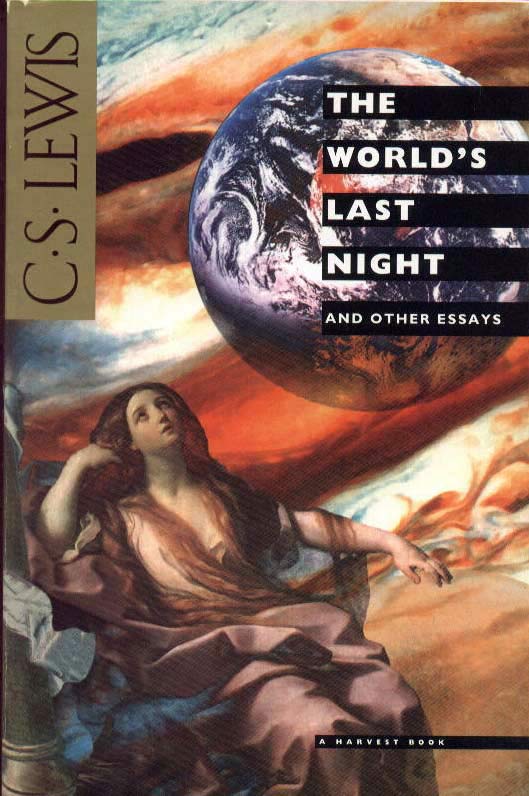
Buy it from Amazon
FYI, these are sometimes referral links!
| Subtitle | And other essays |
| First Written | 1967 |
| Genre | Essays |
| Origin | UK |
| Publisher | Mariner |
| ISBN-10 | 0156983605 |
| My Copy | Cheap paperback |
| First Read | April 02, 2008 |
The World's Last Night
The essays are very different, but it's a great reminder about what a solid thinker Lewis was, and how he could take a tired topic and turn it around.
The Efficacy of Prayer is a short work explaining that prayer can't always work, because it's not magic or science - it's making a request of a person. Prayer is more like asking someone to pass the salt than it is like a physics experiment.
On Obstinacy in Belief explores why we sometimes we value skepticism and mistrust (like in science) and sometimes we value trust beyond the evidence (like in love and friendship). Christian belief is more like the second.
Lilies that Fester argues that no one will better himself or his society by forcing 'high culture' on it - if there's any good influence to be had (and Lewis thinks there is), it must come from an honest love of the artwork itself.
Screwtape Proposes a Toast is a short expansion or 'afterward' to the famous Screwtape Letters, offering a similar set of upside-down moral injunctions.
Good Work and Good Works is about employment. Lewis suggests that we'd better find jobs that are worth doing on their own, whether anybody pays us to do it or not. He is definitely aware that it's a rare case where anybody can make that choice.
Religion and Rocketry starts to sketch out theological possibilities should life on other planets be discovered. If it sparks your interest, read his Space Trilogy.
The World's Last Night explores the Second Coming, and how awkward it often seems to discuss it.
Noted on April 5, 2013
I'm reading through my C.S. Lewis books this year, to see how they've changed in the decade (or more) since I first read them. This one man's books were really formative in my late teens & early twenties, and I'm curious how they age.
I started with this one, a book of essays. The essay is a great form for Lewis - enough space to build out an idea logically and with some emotional power. He's a really engaging essayist. Some of the topics are less pertinent today then when they were written (I suppose), and he sometimes has the feel of an old guy arguing against inevitability - or worse, sometimes arguing against something that's already faded into the past.
Noted on April 5, 2013
There might be different sorts and different degrees of fallenness. We must surely believe that the divine charity is as fertile in resource as it is measureless in condescension.
Quoted on April 5, 2013
Until quite recently until the latter part of the last century it was taken for granted that the business of the artist was to delight and instruct his public.
Quoted on April 5, 2013
Those who read poetry to improve their minds will never improve their minds by reading poetry. For the true enjoyments must be spontaneous and compulsive and look to no remoter end. The Muses will submit to no marriage of convenience.
Quoted on April 5, 2013
To love involves trusting the beloved beyond the evidence, even against much evidence. No man is our friend who believes in our good intentions only when they are proved. No man is our friend who will not be very slow to accept evidence against them. Such confidence, between one man and another, is in fact almost universally praised as a moral beauty, not blamed as a logical error. And the suspicious man is blamed for a meanness of character, not admired for the excellence of his logic.
Quoted on April 5, 2013
If human life is in fact ordered by a beneficent being whose knowledge of our real needs and of the way in which they can be satisfied infinitely exceeds our own, we must expect a priori that His operations will often appear to us far from beneficent and far from wise, and that it will be our highest prudence to give Him our confidence in spite of this.
from Obstinacy in Belief
Quoted on April 5, 2013
But the Christians seem to praise an adherence to the original belief which holds out against any evidence whatever. I must now try to show why such praise is in fact a logical conclusion from the original belief itself.
This can be done best by thinking for a moment of situations in which the thing is reversed. In Christianity such faith is demanded of us; but there are situations in which we demand it of others. There are times when we can do all that a fellow creature needs if only he will trust us. In getting a dog out of a trap, in extracting a thorn from a child's finger, in teaching a boy to swim or rescuing one who can't, in getting a frightened beginner over a nasty place on a mountain, the one fatal obstacle may be their distrust. We are asking them to trust us In the teeth of their senses, their imagination, and their intelligence. We ask them to believe that what is painful will relieve their pain and that what looks dangerous is their only safety. We ask them to accept apparent impossibilities: that moving the paw farther back into the trap is the way to get it out--that hurting the finger very much more will stop the finger hurting-- that water which is obviously permeable will resist and support the body...
Quoted on April 5, 2013